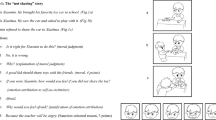Abstract
This study explored the impact of bibliotherapy and parent-child discussion on a child's understanding of death using a true experimental posttest-only control group design. Study participants included 16 girls and 13 boys aged 4 or 5 and their parents. Participants were randomly assigned to either control or experimental groups. Families in the experimental group read books provided by the experimenter and, while following a curriculum, discussed the issue of death. Fourteen “sessions,” lasting from 15 to 20 minutes, took place in participants' homes over a 5-week period. Following this experience, both groups of children were interviewed by the experimenter. A t-test did not show a statistically significant difference between the groups at the .05 level. Reasons for this result and recommendations for future studies are given.
Similar content being viewed by others
REFERENCES
Adams-Greenly, M. (1984). Helping children communicate about serious illness and death. Journal of Psychosocial Oncology, 2(2), 61-72.
Beauchamp, N. W. (1974). The young child's perception of death. Dissertation Abstracts International, 35, 3288A-3289A.
Brandenberg, A. (1979). The two of them. New York: Greenwillow Books.
Brookshire, M., & Noland, M. P. (1985). Teaching children about death. Elementary School Guidance and Counseling, 20(1), 75-79.
Carrick, C. (1976). The accident. New York: Houghton Mifflin.
Childers, W., & Wimmer, M. (1971). The concept of death in children. Child Development, 42, 1299-1301.
Claes-Goran, W. (1984). Qualitative age-related differences in the meaning of the word “death” to children. Death Education, 8, 333-347.
Dabcovich, L. (1986). Mrs. Huggins and her hen Hannah. New York: Dutton.
De Paola, T. (1973). Nana upstairs and Nana downstairs. New York: G.P. Putnam.
Edwards, P. A., & Simpson, L. (1986). Bibliotherapy: A strategy for communication between parents and their children. Journal of Reading, 30(2), 110-118.
Fassler, J. (1983). My grandpa died today. New York: Human Sciences Press.
Gartley, W., & Bernasconi, M. (1967). The concept of death in children. Journal of Genetic Psychology, 110, 71-85.
Green, M. (1986). Helping children and parents deal with grief. Contemporary Pediatrics, 23, 84-98.
Hoffman, S. I., & Strauss, S. (1985). The development of children's concepts of death. Death Studies, 9, 469-482.
Hynes, A., & Hynes-Berry, M. (1986). Bibliotherapy, the interactive process: A handbook. Boulder, CO: Westview Press.
Kane, B. (1979). Children's concepts of death. Journal of Genetic Psychology, 134, 141-153.
Koocher, G. P. (1972). Childhood, death, and cognitive development. Dissertation Abstracts International, 33, 4512B.
Koocher, G. P. (1986). Coping with a death from cancer. Journal of Consulting and Clinical Psychology, 54(5), 623-631.
Lonetto, R. (1980). Children's conceptions of death. New York: Springer.
Nagy, M. (1948). The child's theories concerning death. Journal of Genetic Psychology, 73, 3-27.
Orbach, I. (1986). The “insolvable problem” as a determinant in the dynamics of suicidal behavior in children. American Journal of Psychotherapy, 40(4), 511-520.
Orbach, I., Gross, Y., Glaubman, H., & Berman, D. (1985). Children's perception of death in humans and animals as a function of age, anxiety and cognitive ability. Journal of Child Psychology and Psychiatry and Allied Disciplines, 26(3), 453-463.
Ouzts, D. (1984). Breaking the emotional barrier through the bibliotherapeutic process. Reading Horizons, 24(3), 153-157.
Palmer, B. C., Biller, D. L., Rancourt, R. E., & Teets, K. A. (1997). Interactive bibliotherapy: An effective method for healing and empowering emotionally-abused women. Journal of Poetry Therapy, 11(1), 3-15.
Pohlman, J. C. (1984). Illness and death of a peer in a group of three-year-olds. Death Education, 8, 123-136.
Schrank, F. (1977). A semantic differential study concerning attitude change of fourth-grade children toward slow-learning children utilizing imaginative literature as a psychological field. Unpublished educational specialist thesis, University of Tennessee.
Schrank, F. A., & Engels, D. W. (1981). Bibliotherapy as a counseling adjunct: Research findings. Personnel and Guidance Journal, 60, 143-47.
Sells, S. P., Smith, T. E., & Sprenkle, D. (1995). Integrating quantitative and qualitative research methods: A research model. Family Process, 34, 1-20.
Siebert, D. (1993). Death themes in the literature for children ages 3–8. Journal of School Health, 63, 86-90.
Slavin, L., O'Malley, J., Koocher, G., & Foster, D. (1982). Communication of the cancer diagnosis to pediatric patients: Impact on long-term adjustment. American Journal of Psychiatry, 139(2), 179-183.
Smith, A. G. (1989). Reading guidance: Death and grief. Journal of Poetry Therapy, 3(1), 23-28.
Smith, T. E. & Counsell, S. (1991). Scripture as narrative and therapy. Journal of Poetry Therapy, 4(3), 149-163.
Speece, M. W. (1987). The development of three components of the death concept. Dissertation Abstracts International, 48(4-B) 1170.
Speece, M. W., & Brent, S. B. (1984). Children's understanding of death: A review of three components of a death concept. Child Development, 55, 1671-1686.
Speece, M.W., & Brent, S.B. (1992). The acquisition of a mature understanding of three components of the concept of death. Death Studies, 16(3), 211-229.
Stambrook, M., & Parker, K. (1987). The development of the concept of death in childhood: A review of the literature. Merrill-Palmer Quarterly, 33(2), 133-157.
Swain, H. L. (1979). Childhood views of death. Death Education, 2, 314-318.
Tillman, C. E. (1984). Bibliotherapy for adolescents: An annotated research review. Journal of Reading, 27, 713-719.
Walco, G. A. (1985). Fatally ill children's comprehension of death. Dissertation Abstracts International, 45(8-B), 2706.
Weineger, O. (1979). Young children's concepts of death and dying. Psychological Reports, 44, 395-407.
Wise Brown, M. (1938). The dead bird. Reading, Massachusetts: Addison-Wesley.
Woodward, S., Pope, A., Robson, W. J., & Hagen, O. (1985). Bereavement counseling after sudden infant death. British Medical Journal, 290, 363-365.
Yalom, I. (1980). Existential psychotherapy. New York: Basic Books.
Zeball, B. H., & Woolsey, S. F. (1984). SIDS and the family: The pediatrician's role. Pediatric Annals, 13(3), 237-261.
Author information
Authors and Affiliations
Corresponding author
Rights and permissions
About this article
Cite this article
Todahl, J., Smith, T.E., Barnes, M. et al. Bibliotherapy and Perceptions of Death by Young Children. Journal of Poetry Therapy 12, 95–107 (1998). https://doi.org/10.1023/A:1021442300210
Issue Date:
DOI: https://doi.org/10.1023/A:1021442300210




